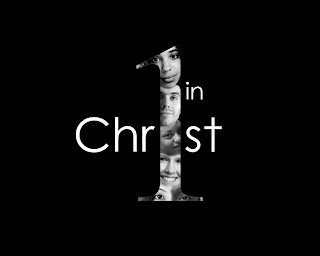One in Christ . . . really?
In all probability, as Jesus grew up in Nazareth, he heard his own father and the other men of the synagogue pray every morning,
And really, in all respects, you still hear this today. “God thanks for not making me grow up next to a Muslim family. God thanks for not making me like those people down the street. God thanks for letting me have a boy instead of a girl.” The prejudice that Jesus would have heard in the Temple 2000 years ago still creeps into our psyche and everyday discourse.
People judge people. We rank people. We classify job descriptions and parental nationalities as signs of whether or not we’d be a good match for a couple’s outing. We compare the dress of the couple’s children to the types of homes they have and the types of cars they drive. We judge. We classify. We categorize. We label. We intentionally separate ourselves from those who are different, disgusting, or diverse.
So to hear Paul say, “There is neither Jew nor Greek, neither slave nor free, male nor female but we are all one in Christ Jesus” is powerful, it’s daring. It flies in the face of traditional Jewish thought. It usurps the idea that the Jewish nation is the only chosen nation. It creates a new order, a new way, a new paradigm.
But I wonder, do we, today, really mean that all of us are one in Christ Jesus?
To believe we are all one in Christ Jesus is hard. It means creating a new paradigm and shattering the old one. It means upsetting the status quo and sometimes means foregoing the life you were taught to live.
To be one in Christ is to be part of a family that is bigger than race. It is bigger than color. It is bigger and vaster than our paradigms and prejudices allow us to be. To be one in Christ is to share community with everyone we meet. It is to love, support, and truly see the sanctity of all human life. It means the walls of racism, the walls of prejudices come down, tear down, fall down so we can see the value, sacredness, and blessedness of all of God’s people.
To be one in Christ is to be an ‘us’ and not a ‘them.’ It’s to see people as an “us” and not as a “them.” It’s for all who call on the name of the Lord. It’s for anybody and everybody. It is the homosexual, the blue collar farmer, the white color attorney, the transvestite, the single mother, and the eight year old with Down syndrome. To be one in Christ is to look out across the world with the faith that God sees no partiality, but rather love, and that love is available for all. That love is obtainable for all people. That love is accessible to all people. That love signifies that we are all one in the body of Christ. We are one in the bond of love. We are one in Christ Jesus.
And my question is, "Do we really believe this?"
Praise be God that he has not created me a Gentile. Praise be God that He has not created me a woman. Praise be God that he has not created me a slave or an ignorant man.This form of thanksgiving was widely used in first century Palestine, and it reflects very clearly the social attitudes of that day. Obviously a free, Jewish male regarded himself as inherently superior to any other form of humanity, and this kind of prejudiced provincialism was the cultural atmosphere in which Jesus began to "live and move and have His being” as a child.
And really, in all respects, you still hear this today. “God thanks for not making me grow up next to a Muslim family. God thanks for not making me like those people down the street. God thanks for letting me have a boy instead of a girl.” The prejudice that Jesus would have heard in the Temple 2000 years ago still creeps into our psyche and everyday discourse.
People judge people. We rank people. We classify job descriptions and parental nationalities as signs of whether or not we’d be a good match for a couple’s outing. We compare the dress of the couple’s children to the types of homes they have and the types of cars they drive. We judge. We classify. We categorize. We label. We intentionally separate ourselves from those who are different, disgusting, or diverse.
So to hear Paul say, “There is neither Jew nor Greek, neither slave nor free, male nor female but we are all one in Christ Jesus” is powerful, it’s daring. It flies in the face of traditional Jewish thought. It usurps the idea that the Jewish nation is the only chosen nation. It creates a new order, a new way, a new paradigm.
But I wonder, do we, today, really mean that all of us are one in Christ Jesus?
To believe we are all one in Christ Jesus is hard. It means creating a new paradigm and shattering the old one. It means upsetting the status quo and sometimes means foregoing the life you were taught to live.
To be one in Christ is to be part of a family that is bigger than race. It is bigger than color. It is bigger and vaster than our paradigms and prejudices allow us to be. To be one in Christ is to share community with everyone we meet. It is to love, support, and truly see the sanctity of all human life. It means the walls of racism, the walls of prejudices come down, tear down, fall down so we can see the value, sacredness, and blessedness of all of God’s people.
To be one in Christ is to be an ‘us’ and not a ‘them.’ It’s to see people as an “us” and not as a “them.” It’s for all who call on the name of the Lord. It’s for anybody and everybody. It is the homosexual, the blue collar farmer, the white color attorney, the transvestite, the single mother, and the eight year old with Down syndrome. To be one in Christ is to look out across the world with the faith that God sees no partiality, but rather love, and that love is available for all. That love is obtainable for all people. That love is accessible to all people. That love signifies that we are all one in the body of Christ. We are one in the bond of love. We are one in Christ Jesus.
And my question is, "Do we really believe this?"




Comments